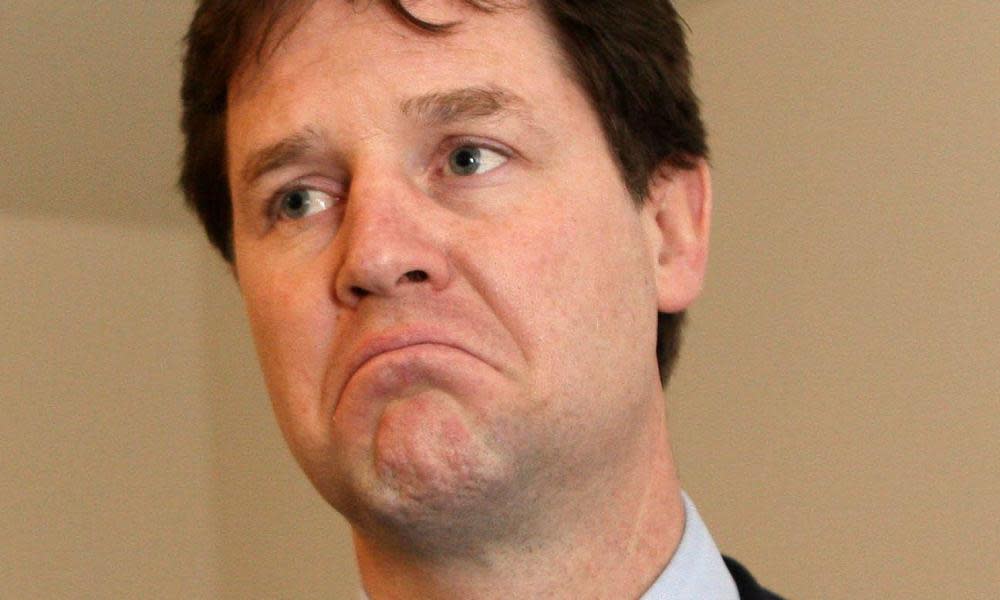Nick Clegg’s loss of Sheffield Hallam seals his rise and fall

When Nick Clegg stood on the stage at Sheffield Hallam on Friday morning and heard the declaration that he had lost his seat by 2,125 votes, he was a long way from the moment of political euphoria that produced “Cleggmania” and caused David Cameron, Gordon Brown and voters across the country to declare: “I agree with Nick”.
The extraordinary excitement that set Clegg on the path to political power was prompted by his debate performances in the run-up to the 2010 general election. Soon afterwards, and despite an electoral performance that failed to match the rise in the polls, he appeared in the Downing Street garden alongside the new prime minister, to whom he had become deputy.
Though the Lib Dems actually lost seats, the 2010 election left neither Labour nor the Conservatives able to form a government without Clegg’s MPs. The Lib Dem leader had suddenly become the kingmaker.
With his party naturally aligned more closely to Labour than to the Tories, some were surprised Clegg was willing to enter into coalition with Cameron. But the the pair appeared relaxed in each other’s presence and hailed an agreement they said was a “sign of … our sincere determination to work together”.
They promised a “new politics, where the national interest is more important than party interest”.
Speaking early on Friday morning, Clegg’s former adviser James McGrory stressed that point, saying the former Lib Dem leader was “someone who always put his country before his party and himself”. He said: “History will judge him very kindly indeed. Liberalism, pro-Europeanism, the centre ground and good sense have all lost a profound voice in parliament.”
Perhaps the lowest of low points was to follow only about seven months after the Downing Street garden triumph. The Lib Dem manifesto for the May vote pledged to phase out tuition fees within six years and scrap them immediately for final-year students. By December that year, Clegg and other Lib Dems had voted to raise the tuition fee cap to £9,000 a year.
That came after months of protests in which thousands took to the streets. In the run-up to the 2015 election, with his poll ratings falling, Clegg issued a public apology for making the pledge.
Relations with his Tory coalition partners eventually grew so sour that he told No 10 he was not even prepared to speak to his cabinet colleague Michael Gove.
He had once been advised to join the Conservative party by one of his first bosses in politics, the Tory politician Leon Brittan. Clegg worked as his speechwriter after a brief stint at the Financial Times. That followed his studies at Cambridge University and a master’s degree at the College of Europe in Bruges, a university focusing on the study of the EU.
In the event, he joined the Lib Dems and became MEP for the East Midlands in 1999, then MP for Sheffield Hallam in 2005. In 2008, the year after he became the leader of his party, he did a now infamous interview with GQ magazine in which he said he had slept with “no more than 30 women”, a statement that was read as an admission he was a lothario.
After the Lib Dem massacre at the 2015 election, Clegg found himself outside government and focusing on Brexit. It would be that issue that helped him salvage something of his reputation, as he addressed crowds of tens of thousands in London before the triggering of article 50.
Accusing the Labour and Tory leaders of forming “a pact of silence” to avoid the issue of Brexit during the election campaign, he became something of a spokesman for those who still held out hope of remaining in the EU, even as his party – under Tim Farron – appeared to be struggling in the polls.
On Thursday night, it became clear that none of it was enough to save him. Sheffield Hallam no longer agreed with Nick.

 Yahoo News
Yahoo News 
